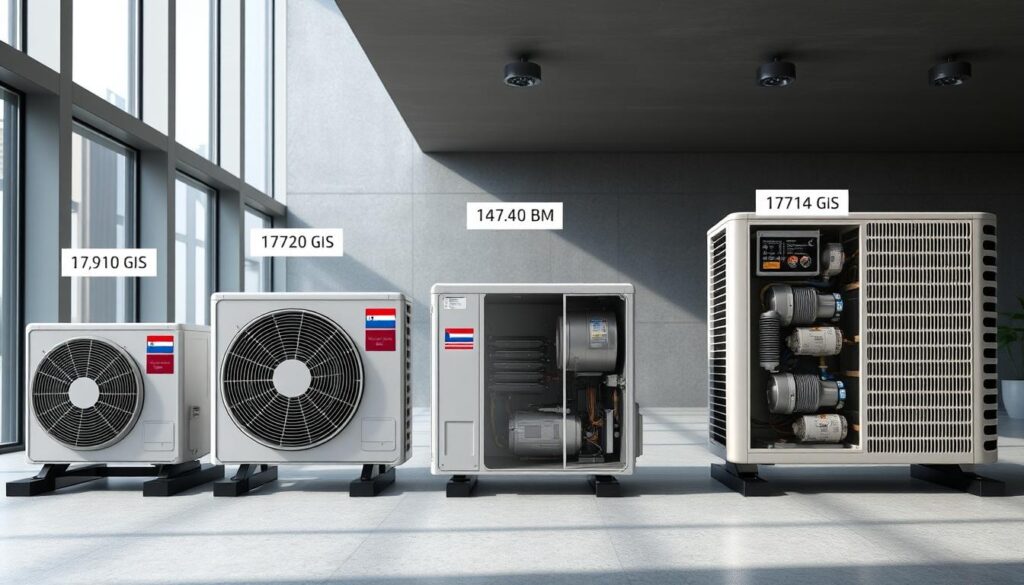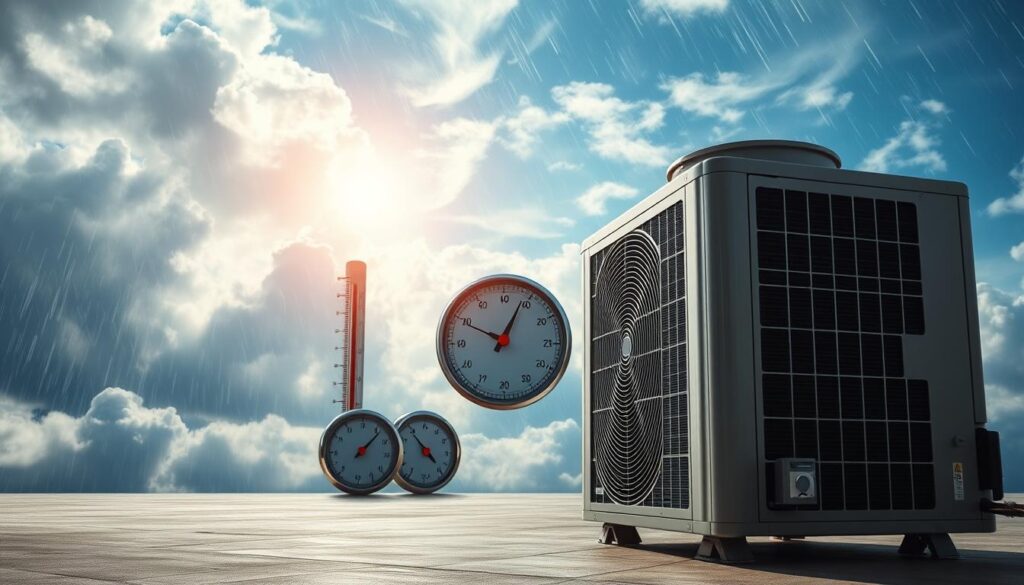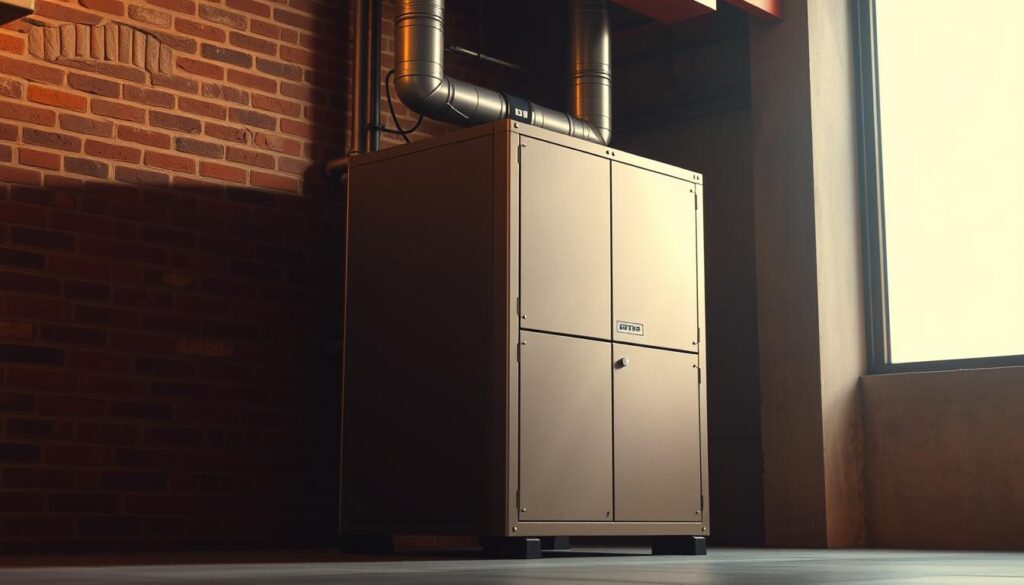Affiliate Disclosure
HVAC Guide Guys is a participant in the Amazon Services LLC Associates Program, an affiliate advertising program designed to provide a means for sites to earn advertising fees by advertising and linking to Amazon.
How Long Can HVAC Units Last? Ever wondered how long your home’s heating and cooling system will last? Knowing how long HVAC units last can save you thousands. It helps you plan for future home maintenance.

The lifespan of an HVAC unit varies from 15 to 25 years. This depends on maintenance, usage, and environmental conditions. Understanding this can help you make better decisions about repairs and replacements.
Your home’s comfort and energy efficiency rely on a good HVAC system. Regular maintenance and knowing warning signs can extend your system’s life.
Key Takeaways
- Typical HVAC system lifespan is 15-25 years
- Maintenance dramatically impacts unit longevity
- Climate and usage affect HVAC performance
- Regular inspections can prevent costly replacements
- Energy efficiency decreases with older systems
Table of Contents
Understanding HVAC System Lifespan Basics
Your HVAC system is a big investment in home comfort. Knowing how long it lasts helps you make smart choices about upkeep and when to replace it. Most home HVAC systems last between 15 to 25 years. This depends on several important factors.
Different parts of your HVAC system have their own lifespans. This is based on how much you use it, how well you take care of it, and the environment it’s in. Keeping track of your HVAC’s age can help you plan for when you might need a new one. It also helps avoid sudden breakdowns.
Critical Factors Affecting HVAC Durability
- Regular maintenance frequency
- Installation quality
- Local climate conditions
- Usage intensity
- System age and model
Typical HVAC Component Lifespans
Here’s a quick look at how long different HVAC parts usually last:
- Gas Furnaces: 20-30 years
- Air Conditioners: 15-20 years
- Heat Pumps: 10-20 years
- Boilers: 20-35 years
Coastal areas can make your equipment last less because of salt and harsh weather. Regular professional upkeep can extend your HVAC’s life and keep it running well.
Explore Our HVAC Shop
Looking for top-rated HVAC tools, parts, and accessories? Visit our shop and find the perfect solution for your needs.
Visit the ShopHow Long Can HVAC Units Last: A Comprehensive Guide
Knowing how long HVAC units last is key for homeowners planning their budgets. The lifespan of an HVAC unit varies based on several factors. Most systems work well for 15 to 20 years with regular care.
Your HVAC system’s life depends on several important things:
- Quality of initial installation
- Regular maintenance frequency
- Local climate conditions
- Usage intensity
- System type and brand
Different parts of your HVAC system have different lifespans. Electric furnaces can last up to 40 or 50 years. Central air conditioning units usually last 15 to 20 years. Heat pumps last 10 to 15 years, with ground-source models lasting longer.
“Proactive maintenance is the secret to maximizing your HVAC system’s operational life,” says HVAC industry expert Michael Thompson.
To know how long HVAC units last, follow these tips:
- Schedule annual professional inspections
- Replace filters every three to six months
- Keep outdoor units clean and debris-free
- Maintain consistent temperature settings
- Invest in professional installation
By following these tips, you can make your HVAC unit last longer. This will also keep your system running well for years.
Explore Our HVAC Shop
Looking for top-rated HVAC tools, parts, and accessories? Visit our shop and find the perfect solution for your needs.
Visit the ShopThe Lifespan of Different HVAC Components
Knowing how long your HVAC system lasts is key to keeping your home comfy and saving money over time. Each part of your HVAC system lasts differently. This depends on how well you take care of it, how often you use it, and the weather around you.
Your HVAC unit’s lifespan affects your home’s energy use and comfort. Let’s look at how long the main parts of your HVAC system usually last:
Central Air Conditioning Units
Central air conditioning units usually last between 15 to 20 years. Their lifespan can be influenced by:
- How well they were installed
- How often they get checked and maintained
- The local weather
- How you use them
Furnaces and Boilers
Heating systems can last a long time, with different lifespans:
| Heating System Type | Expected Lifespan |
|---|---|
| Gas Furnaces | 20-30 years |
| Oil Furnaces | 10-15 years |
| Boilers | 20-35 years |
Heat Pumps and Their Longevity
Heat pumps are great for both heating and cooling. They usually last 10 to 20 years. Keeping them well-maintained can make them last longer, which is good for your wallet and the planet.
Getting regular checks from pros and keeping up with maintenance is essential. It helps your HVAC system’s parts last longer.
Signs Your HVAC System Needs Replacement
Knowing when to replace your HVAC system can save you money and avoid sudden breakdowns. Your heating and cooling system doesn’t always shout when it’s failing. But, it does send quiet signals that something’s off.
Look out for these important signs that your HVAC system might need to be replaced:
- Increasing Energy Bills: A sudden jump in your energy bills could mean your HVAC system is losing efficiency.
- Frequent Repairs: If repair costs are close to half the price of a new system, it’s time to think about replacing.
- Inconsistent Temperatures: If rooms are too hot or cold, or if the temperature is uneven, it’s a sign of a problem.
- Age of System: Most HVAC units last 15-25 years. After 10 years, they start to lose their effectiveness.
When you see these signs, it’s time to think about when you should replace your HVAC system. Experts say it’s wise to consider replacement if:
- Your system is over 10 years old.
- It needs repairs often.
- It makes strange noises or smells.
- It can’t keep your home at a comfortable temperature.
Replacing your HVAC system early can save you up to 30% on energy costs. Don’t wait until it completely breaks down. Replacing it early can keep your home comfortable and save your money.
Maximizing Your HVAC System’s Lifespan Through Maintenance
Keeping your HVAC system in top shape is key. Regular maintenance can make your heating and cooling system last longer. This means you won’t have to replace it as often and it will work better.
To keep your HVAC system running smoothly, you need a plan. Homeowners can follow simple steps to keep their system efficient. This helps extend the life of your HVAC unit.
Regular Maintenance Checklist
- Inspect system components quarterly
- Clean outdoor units monthly
- Check refrigerant levels annually
- Lubricate moving parts as needed
- Listen for unusual noises during operation
Professional Service Requirements
Getting help from HVAC experts is important. They suggest regular, detailed inspections.
| Service Type | Frequency | Key Checks |
|---|---|---|
| Heating System | Annually (Fall) | Burner efficiency, heat exchanger, gas connections |
| Cooling System | Annually (Spring) | Refrigerant levels, condenser coil, electrical connections |
Filter Maintenance Guidelines
Air filters are vital for your HVAC’s health. Replace filters every 90 days. Do this more often if you have pets, live in a dusty area, or have allergies.
Regular maintenance can extend your HVAC system’s life by 5-10 years. It can also cut energy costs by up to 40%.
By sticking to these maintenance tips, you’ll keep your HVAC system running well. This ensures your home stays comfortable and energy-efficient for many years.
Explore Our HVAC Shop
Looking for top-rated HVAC tools, parts, and accessories? Visit our shop and find the perfect solution for your needs.
Visit the ShopImpact of Climate and Usage on HVAC Longevity

Your HVAC unit’s lifespan depends on climate and usage. Different environments can greatly affect how long it works well. Knowing these factors can help you make better choices about upkeep and when to replace it.
Climate is key in how long your HVAC lasts. In hot places like Arizona, where summers hit 107°F, systems usually last 12 to 15 years. But, cooler areas can make systems last longer because they work less hard.
- Extreme temperatures speed up wear
- Humidity affects mechanical parts
- How often you use it affects its life
How you use your HVAC also matters. Running it all the time or getting the wrong size can make it wear out faster. A system that’s too small works too hard, and one that’s too big turns on and off too much. Both shorten its life.
To fight climate and usage issues, take proactive steps. Keep your home at 60-70°F when it’s really hot, make sure it’s well-insulated, and get regular check-ups. These actions can keep your HVAC running well and make it last longer.
Proper maintenance can cut HVAC system costs by up to 40 percent.
Cost Considerations: Repair vs. Replace
Choosing the right option for your HVAC system can save you a lot of money. It’s important to know when to replace your HVAC unit. This knowledge helps homeowners make smart choices and get the most value from their investment.
The $5,000 Rule for HVAC Replacement
The $5,000 rule is a simple way to decide between fixing or replacing your HVAC system. Here’s how it works:
- Multiply the age of your HVAC unit by the repair cost
- If the total is under $5,000, consider repairing
- If the total exceeds $5,000, replacement is recommended
“Knowing when to repair or replace can save you significant money in the long term.” – HVAC Industry Expert
Energy Efficiency Benefits
Upgrading your HVAC system can lead to big energy savings. Modern units with higher SEER ratings use less energy:
| SEER Rating | Energy Savings |
|---|---|
| 9 to 14 | 35% reduction in energy consumption |
| 14 to 26 | Up to 50% energy savings |
When thinking about HVAC replacement, remember these financial benefits:
- Federal tax credits up to 30% of system cost
- Potential utility rebates
- Significant long-term energy bill reductions
Pro tip: Always consult with a professional HVAC technician to get a personalized assessment of your specific system’s condition and replacement needs.
Modern HVAC Technologies and Their Durability

Technological advancements are changing how we think about HVAC systems. Today’s HVAC technologies are made to be more efficient and last longer. They come with features we couldn’t imagine just a few years ago.
Smart technologies are changing HVAC maintenance and performance. Key innovations include:
- Variable-speed compressors that adjust cooling and heating output
- Intelligent zoning systems for personalized temperature control
- Smart thermostats with predictive maintenance capabilities
- Advanced diagnostic monitoring systems
Variable-speed compressors are a big step forward in HVAC durability. These advanced components can operate at different speeds, reducing wear and tear. They keep your home at the right temperature without overworking.
Smart thermostats are also making a big difference. They give you real-time data on your system’s performance and energy use. Some even send alerts to HVAC contractors for early maintenance.
“Technology is making HVAC systems smarter, more efficient, and potentially longer-lasting,” says industry expert William Brittingham.
Zoned systems also help your HVAC system last longer. They spread the workload across your home. This reduces stress on parts, making your system last longer.
Explore Our HVAC Shop
Looking for top-rated HVAC tools, parts, and accessories? Visit our shop and find the perfect solution for your needs.
Visit the ShopEnvironmental Factors Affecting HVAC Lifespan
Your HVAC unit’s life depends a lot on the environment. Different places can make your system last longer or shorter. This affects how long your HVAC unit works well.
The weather is key in how long your HVAC lasts. Bad weather can make your system wear out faster. Places near the coast have extra problems because of salt and moisture in the air.
- Coastal environments increase corrosion risks
- High humidity strains HVAC components
- Extreme temperatures impact system efficiency
The air quality also matters a lot. In polluted cities, bad air can damage your HVAC more. Dust and pollutants can make your system less efficient.
| Environmental Factor | Impact on HVAC Lifespan |
|---|---|
| Coastal Proximity | Reduces lifespan by 10-20% |
| High Pollution Areas | Decreases efficiency by 5-15% |
| Extreme Weather | Can shorten lifespan by 15-25% |
To keep your HVAC safe, choose the right spot, do regular checks, and use protective gear. Buying top-notch parts and getting it installed by pros can help fight off environmental damage. This can make your system last longer.
Conclusion
Knowing how long HVAC units last is key for homeowners. A well-kept HVAC system can last 15 to 25 years. But, many factors affect its lifespan.
Keeping up with HVAC maintenance is vital. Regular checks and air filter changes can prevent damage. Watch for signs like high energy bills or uneven temperatures.
Investing in HVAC care saves money and energy. It also makes your system last longer. Knowing your system’s needs helps you make smart choices about repairs or replacements.
Check your HVAC’s condition and plan maintenance. Being proactive keeps your home comfy and saves money. This way, your HVAC investment will pay off for years.
